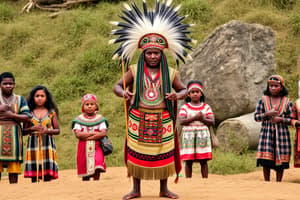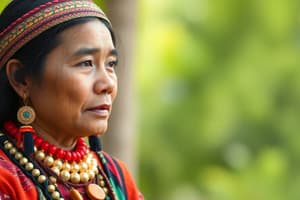Podcast
Questions and Answers
What does losing an indigenous language primarily signify for a community?
What does losing an indigenous language primarily signify for a community?
- A decrease in cultural practices
- A valuable loss of historical information (correct)
- Reduction in language complexity
- Increased communication with dominant cultures
How do indigenous languages contribute to knowledge systems?
How do indigenous languages contribute to knowledge systems?
- By offering universal knowledge applicable everywhere
- By promoting the adoption of dominant languages
- By simplifying communication among diverse groups
- By encapsulating specialized knowledge about local ecosystems (correct)
Which aspect of languages makes them especially interesting to study?
Which aspect of languages makes them especially interesting to study?
- Their significant similarities across cultures
- Their ability to express emotions and attitudes
- Their intricate structures and grammatical systems (correct)
- Their role in promoting economic trade
What is primarily responsible for the abandonment or extinction of indigenous languages?
What is primarily responsible for the abandonment or extinction of indigenous languages?
What role does the increased advocacy for indigenous languages play in contemporary society?
What role does the increased advocacy for indigenous languages play in contemporary society?
What defines an Indigenous Peoples' language?
What defines an Indigenous Peoples' language?
What is a consequence of IP children learning national or official languages instead of their own?
What is a consequence of IP children learning national or official languages instead of their own?
Why is studying languages critical for understanding the human mind?
Why is studying languages critical for understanding the human mind?
What is the primary result of a lack of communication between different linguistic communities?
What is the primary result of a lack of communication between different linguistic communities?
How many indigenous languages are currently employed as mother languages in the Philippines?
How many indigenous languages are currently employed as mother languages in the Philippines?
Which of the following languages are widely used for communication among indigenous peoples in the Philippines?
Which of the following languages are widely used for communication among indigenous peoples in the Philippines?
What is the status of the 11 dying languages in the Philippines?
What is the status of the 11 dying languages in the Philippines?
How many languages are considered to be 'in trouble' among the indigenous languages in the Philippines?
How many languages are considered to be 'in trouble' among the indigenous languages in the Philippines?
What initiative acknowledges the benefits of using the learner's mother tongue in education?
What initiative acknowledges the benefits of using the learner's mother tongue in education?
Which classification describes languages that are in a vigorous state in the Philippines?
Which classification describes languages that are in a vigorous state in the Philippines?
What is the total number of individual languages listed for the Philippines?
What is the total number of individual languages listed for the Philippines?
What is a primary function of IP literature within the community?
What is a primary function of IP literature within the community?
How does IP literature contribute to the preservation of group history?
How does IP literature contribute to the preservation of group history?
In what way does IP literature define cultural identity?
In what way does IP literature define cultural identity?
What role does IP literature play concerning community rituals?
What role does IP literature play concerning community rituals?
How is IP literature connected to contemporary struggles of Indigenous Peoples?
How is IP literature connected to contemporary struggles of Indigenous Peoples?
What aspect of cultural heritage does IP literature primarily ensure?
What aspect of cultural heritage does IP literature primarily ensure?
Which of the following is NOT a conventional literary form of IP literature in the Philippines?
Which of the following is NOT a conventional literary form of IP literature in the Philippines?
Through what means is IP literature primarily conveyed?
Through what means is IP literature primarily conveyed?
What is one reason why linguistic diversity is important?
What is one reason why linguistic diversity is important?
Which statement best captures the role of languages in relation to cultural identity?
Which statement best captures the role of languages in relation to cultural identity?
Indigenous languages serve as repositories of what?
Indigenous languages serve as repositories of what?
Which of the following is NOT listed as a reason to study indigenous languages?
Which of the following is NOT listed as a reason to study indigenous languages?
What is a potential threat to indigenous languages?
What is a potential threat to indigenous languages?
How do indigenous languages contribute to the conservation of cultural characteristics?
How do indigenous languages contribute to the conservation of cultural characteristics?
What is the significance of understanding indigenous languages according to the module's objectives?
What is the significance of understanding indigenous languages according to the module's objectives?
Which of these is a form of indigenous literature?
Which of these is a form of indigenous literature?
What does Martinez Cobo's expanded definition of IP language emphasize?
What does Martinez Cobo's expanded definition of IP language emphasize?
What is classified as a dominant regional language?
What is classified as a dominant regional language?
According to the UN General Assembly, how should IP languages be perceived?
According to the UN General Assembly, how should IP languages be perceived?
What is one major factor attributed to linguistic diversity in the Philippines?
What is one major factor attributed to linguistic diversity in the Philippines?
What natural process contributes to linguistic diversity according to Curtis McFarland?
What natural process contributes to linguistic diversity according to Curtis McFarland?
How do IP languages function in the lives of indigenous people today?
How do IP languages function in the lives of indigenous people today?
What significance do languages hold for indigenous communities?
What significance do languages hold for indigenous communities?
Which of the following is NOT a role of national languages in relation to IP languages?
Which of the following is NOT a role of national languages in relation to IP languages?
Study Notes
Why Studying Indigenous Languages and Literature Matters
- The study of Indigenous languages and literature is crucial for understanding and preserving cultural heritage and identity of Indigenous Peoples (IPs).
- Linguistic diversity enriches human ecology, each language represents unique systems of expressing thoughts and ideas, capturing distinct ways of perceiving and understanding the world.
- Languages are expressions of cultural identity. Indigenous languages are fundamental to maintaining the identity of specific communities, allowing them to pass down traditions, values, and unique ways of life.
- Languages are repositories of history, holding stories, experiences, and knowledge of a people. Studying these languages grants access to historical narratives, oral traditions, and cultural practices, offering valuable information about a community's past.
- Languages contribute to the sum of human knowledge, each language provides a matrix of wisdom of a particular group of people. Studying indigenous languages allows for the accumulation of diverse knowledge systems.
Threats to Indigenous Languages
- The extinction of IP languages has been an adverse outcome of the process of language convergence or they die naturally.
- This is primarily influenced by the utilization of national or official languages in educational institutions, leading to IP children not learning or speaking their own languages.
- Frequent borrowing from dominant languages in the region due to the need to communicate with non-IP individuals further contributes to this threat.
Role of Indigenous Peoples' Languages
- An Indigenous Peoples' language is the unique language spoken by a group of people affiliated with a particular indigenous group.
- Indigenous language is identified with and unique to a specific indigenous community. It may be used as the only language, as the mother tongue, or as the habitual means of communication at home.
- The UN General Assembly recognizes IP languages should not be regarded as second-rate or indifferent. They are a significant part of indigenous peoples' ways of life, culture, and identity.
Philippine Indigenous Languages
- The Philippines is one of the richest sources of linguistic diversity in the world.
- The country's archipelagic nature, composed of numerous islands, contributes to fostering linguistic variety.
- Linguistic diversity in the Philippines is also a result of natural processes; language change and divergence or convergence between linguistic communities.
- The number of individual languages listed for the Philippines is 187, of which 183 are living and 4 are extinct.
- Only 27 of the 175 indigenous languages in the Philippines are currently employed as mother languages, and 13 are considered to be in trouble.
- There are 11 dying IP languages in the Philippines.
Role of Indigenous Literature
- Indigenous literature serves as a form of entertainment during both ordinary days and special occasions, contributing to the cultural expression and enjoyment of the community.
- Indigenous literature functions as a non-material artifact, containing the group's history.
- Stories and legends within IP literature serve as instructional tools, conveying cultural and ethnic identity to future generations.
- Indigenous literature is instrumental in justifying rituals and institutions within the community, providing a narrative framework that guides members to follow prescribed norms.
- Contemporary IP literature becomes a medium for narrating the struggles of IP groups to assert their rights for self-preservation and self-determination.
- Indigenous literature serves as a vehicle for cultural transmission, passing down customs, beliefs, and practices to future generations.
Indigenous Literature in the Philippines
- IP literatures encompass epics, stories, riddles, folk tales, mythology, legends, and oration. Elaborate prayers and ritual chants are also considered forms of IP literature.
- Indigenous literatures are primarily conveyed through oral means, involving telling, memorizing, and retelling.
Studying That Suits You
Use AI to generate personalized quizzes and flashcards to suit your learning preferences.
Related Documents
Description
Explore the significance of studying Indigenous languages and literature in preserving cultural identity and heritage. This quiz highlights the role of these languages in maintaining traditions, history, and unique worldviews of Indigenous Peoples. Understanding these elements enriches our appreciation of global linguistic diversity.




